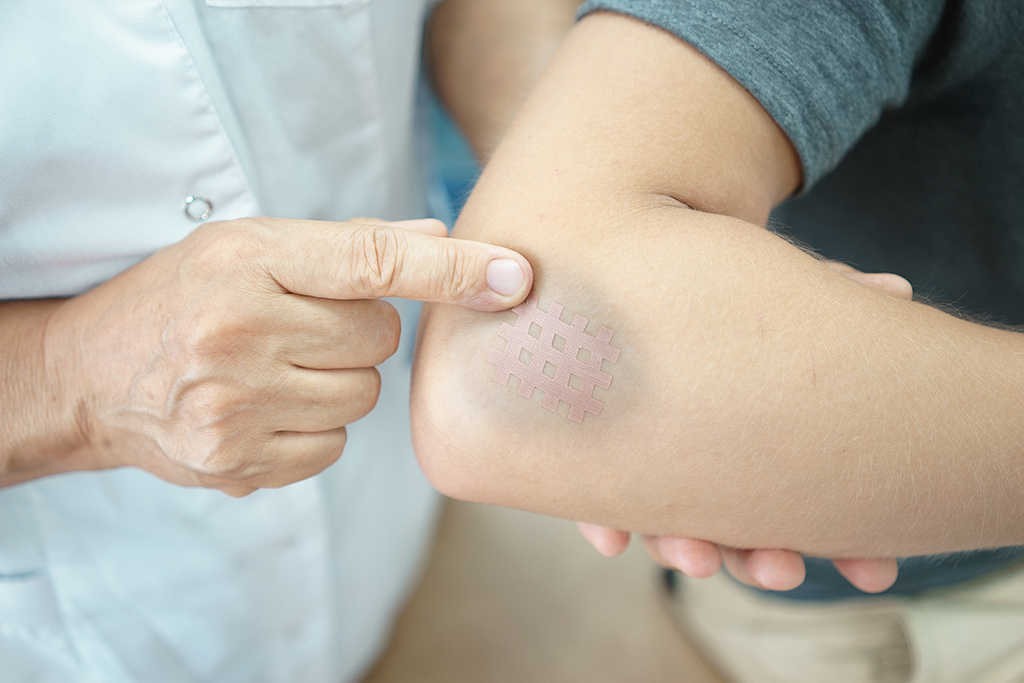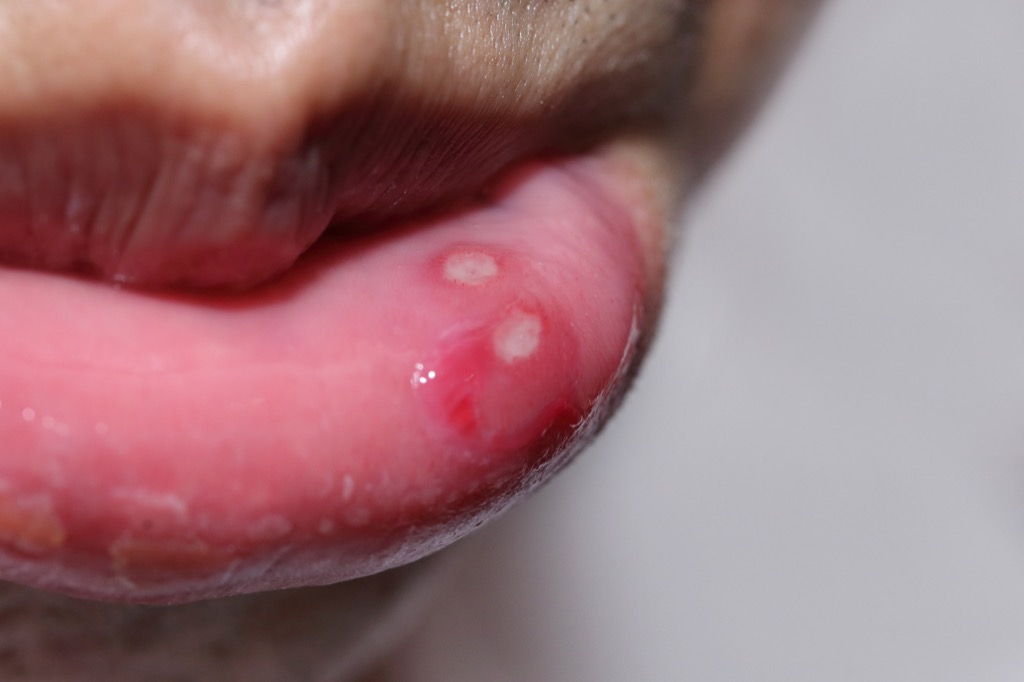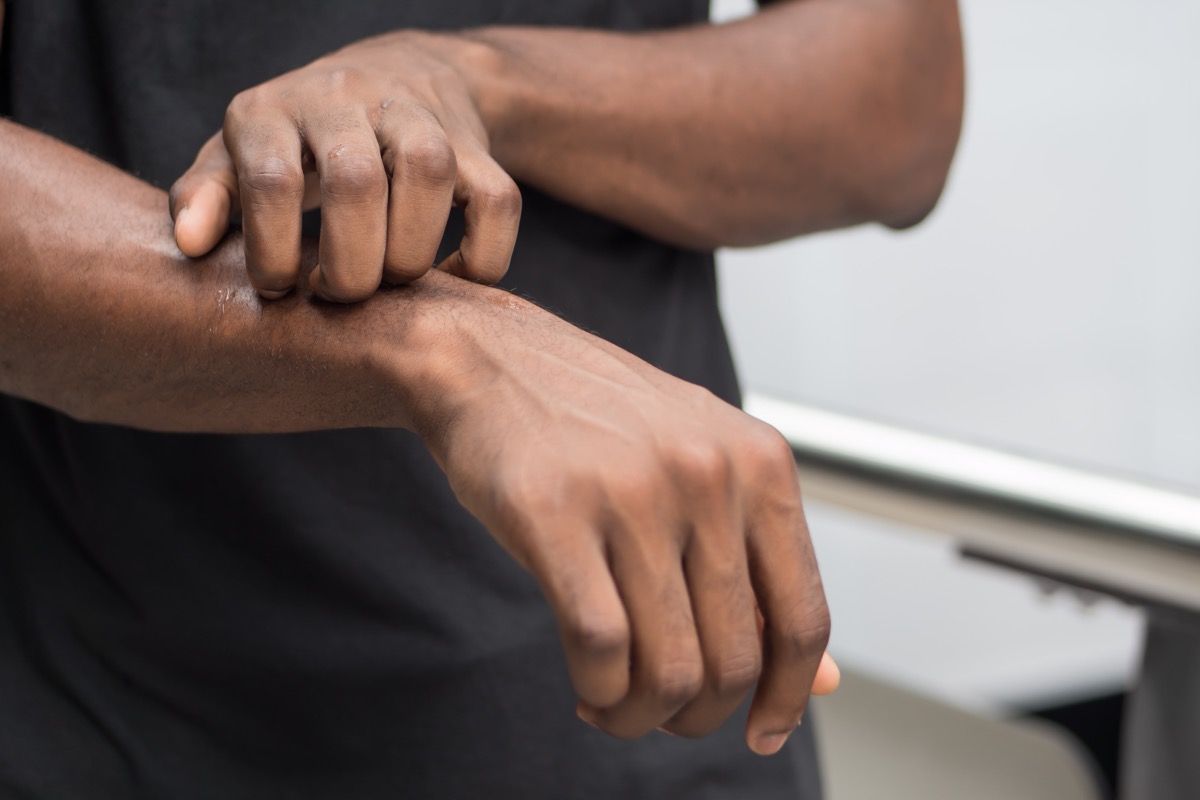40 Subtle Signs Your Body Is Telling You Something’s Seriously Wrong

When you stop to think about it, your body is an amazing thing. Every day, you’re able to think, breathe, eat, and move, thanks to all of your systems working together. But while the body is typically a well-oiled machine, sometimes issues do arise—whether that’s in the form of disease, infection, or injury. Fortunately, there tend to be signs when something is off with your machine. To help you notice them more easily (and follow up on them quickly with your doctor), we’ve rounded up 40 subtle signs of disease that are simple to spot once you know what you’re looking for. And for more health advice, check out The 50 Secret Messages Your Body Is Trying to Tell You.
1
Your eyes are always super dry.

While there are many different reasons for dry eyes—including staring at your computer screen all day—a more serious culprit is Sjögren’s syndrome, an autoimmune disease that causes inflammation of the tear-secreting glands in your eyes, leading to a reduction in tear production and chronic dry eye issues, according to the Sjögren’s Syndrome Foundation. It can also cause your mouth to become dry. And for more things to look out for, check out 17 Warning Signs Your Eyes Are Trying to Tell You About Your Health.
2
You have white patches inside your mouth.

The white patches inside your mouth or white spots on your tongue could be leukoplakia. According to the American Cancer Society, this condition often occurs in those who smoke or use tobacco, and if it’s not treated, it can turn into mouth cancer.
3
You always feel cold.

Are you usually searching for an extra sweater or a blanket to wrap yourself in? When you have low thyroid production, it can result in feeling cold. According to Harvard Medical School, that’s due to the fact that your slowed-down cells are burning less energy, resulting in your body producing less heat. Because of that, you might often find yourself reaching for a sweatshirt when everyone else seems to be happy with the temperature. For more warnings your body is giving you, check out 23 Unexpected Signs You’re at Risk for Heart Disease.
4
You’ve been having really intense dreams.

Your dreams might seem unimportant, but sometimes they can tell you a lot about your health. According to the American Parkinson Disease Association, having super intense and vivid dreams or nightmares—especially if you act them out in your sleep—can be an early sign of Parkinson’s disease.
5
Your fingers change color after being out in the cold.

If your fingers change color after being exposed to cold temps—typically turning white, then blue—it could be due to Raynaud’s disease. According to the Mayo Clinic, the discoloration occurs when the arteries that supply blood to the skin become too narrow. That can also cause your fingers to feel cold and numb until you warm up. For more about your well being, check out 7 Ways Being in Quarantine Has Been Bad for Your Health.
6
You always feel spaced out.

If you’ve been feeling tired, forgetful, and spacey, it could be yet another sign of hypothyroidism. According to the Mayo Clinic, these symptoms can occur when your thyroid gland is underactive and not producing enough of the hormones your body needs to function properly.
7
You always feel bloated.

Bloating can occur due to what you’re eating, but it could also come about because of something more serious. One of the most visible symptoms of ovarian cancer in women is bloating, which occurs due to the buildup of excess fluid in the abdominal cavity, according to Ovarian Cancer Action.
8
Your face looks puffy.

This could be a sign of hypothyroidism, which often results in a puffy or swollen face—as well as thinning hair and muscle weakness—due to your thyroid gland not producing enough hormones, according to the Mayo Clinic. It can lead to serious issues like infertility and heart disease if left untreated. And for more messages from your body, check out 15 Subtle Signs Your Loneliness Is Hurting Your Health.
9
Your hair is falling out.

While millions of people experience hair loss every year, the American Academy of Dermatology says if it begins suddenly, it could be due to an illness. Two possible underlying medical conditions are thyroid disease and anemia, both of which cause hair loss that can be treated and reversed.
10
You’re losing weight without trying to.

For some, the idea of losing weight without even trying sounds like a dream come true. But when this happens in reality, it could be a sign that something’s seriously amiss. Inexplicable weight loss is a symptom of stomach cancer, according to the American Cancer Society, as it could be the result of a loss of appetite or occur as a direct result of the disease.
11
Or you’re gaining a lot of weight—and you’re not sure why.

If you suddenly start gaining weight even though you haven’t changed a thing about your diet or exercise routine, it could be due to hypothyroidism. Because the thyroid hormone regulates metabolism, those who have underactive thyroid glands tend to have a low basal metabolic rate (BMR), which can play a role in weight gain, according to the American Thyroid Association.
12
You have a strange freckle or mole.

While normal moles and freckles are generally round and regularly shaped, spots that are asymmetrical, irregularly bordered, or are increasing in size could be due to melanoma, a deadly form of skin cancer, according to the Skin Cancer Foundation. That’s why performing a total body self-exam regularly is one of the most important things you can do for your health.
“Skin cancer is the most common cancer worldwide. In the United States, there are more new cases of skin cancer each year than all other cancers combined,” says dermatologist Keira L. Barr, MD, founder and chief wellness officer of Resilient Health Institute. “By simply ‘partying’ in your birthday suit every single month and looking for any ‘uninvited guests,’ you have the ability to save your own life.”
13
Your teeth are discolored and sensitive.

Dental erosion is often a subtle indicator of gastroesophageal reflux disease (GERD). “Oftentimes, patients are unaware they suffer from GERD because they don’t have pain. As dental professionals, we can identify the unique pattern that forms from acid being regurgitated back into the mouth,” says Inna Chern, DDS, of New York General Dentistry.
“The damage is usually to the upper front teeth on the palate side and the lower back teeth on the tongue side; the areas are very smooth and often discolored due to the enamel loss,” she says. “General signs of dental erosion due to GERD include sensitivity, discoloration, thinning enamel, jagged edges, tooth pain, and eventual tooth loss due to fracture and decay.”
14
You always have a bitter or sour taste in your mouth.

If you already know you have GERD, you’ll want to be on the lookout for Barrett’s esophagus, a serious complication of GERD that causes the lining of the esophagus to become irritated as a result of repeated exposure to stomach acid, according to Summit Medical Group. Take note it you have a bitter or sour taste in your mouth, as well as a hoarse or raspy voice and unexplained dry coughing. And for tips on improving how you feel, check out 23 Easy Ways You Can Be a Healthier Person During Quarantine.
15
Your fingernails are clubbed.

Nail clubbing—which involves the tips of your fingers becoming enlarged and your nails curving around your fingertips—could be a sign of lung disease. According to the Mayo Clinic, the symptom occurs slowly over time due to the low amount of oxygen in the blood.
16
You’re always leaving things in weird places.

Alzheimer’s disease wreaks havoc on your memory and mental functions, changing your behavior over time. One subtle symptom? Regularly losing things. Because of the disease, it becomes easy to forget where you put items, and oftentimes, they end up in usual places, according to the Alzheimer’s Society.
17
You’re losing your sense of smell.

Having a cold isn’t the only reason your sense of smell might start to vanish. Loss of smell—called hyposmia—is also an early sign of Parkinson’s disease, according to the Parkinson’s Foundation. Because many people go years before realizing the symptom is due to Parkinson’s, it’s always a good idea to bring anything up to your doctor as soon as you notice it.
18
You bruise super easily.

If you find you’ve been bruising more easily than normal, bring it up to your doctor. According to Johns Hopkins Medicine, it could be a symptom of liver failure, which occurs when a large portion of the organ is damaged due to a liver disorder.
19
You have inflamed gums.

If your gums are inflamed, it’s worth bringing the problem up to your dentist and your doctor. According to Harvard Medical School, those who have gum disease have an increased risk of having a heart attack or stroke.
“Chronic levels of inflammation in the mouth have been linked to heart disease. The gum tissue is very vascular, and one theory is that the mouth is a portal into the bloodstream so bacteria can travel from the mouth to various other parts of the body, including blood vessels of the heart,” says Chern. “Another common theory is that the inflammatory cells present in the mouth set off a cascade of vascular damage throughout the body, leading to heart attack and stroke.” And for more about how your mouth affects the rest of you, This Is What Happens to Your Body When You Don’t Floss Your Teeth.
20
You have stiff, inflamed joints.

If you wake up every morning with inflamed, stiff joints, it could be a sign of arthritis, according to the Arthritis Foundation. In rheumatoid arthritis, the problem occurs due to the immune system attacking the lining of the joints.
21
You’re experiencing back pain.

Most people think a heart attack makes itself known when the person suffering it grabs their chest in pain. But that’s just in the movies. In reality, the warning signs are actually very subtle. According to the American Heart Association, a heart attack could also present as pain or discomfort in your back, neck, jaw, stomach, or arms.
22
You commonly get canker sores.

If you commonly get canker sores in your mouth, you could among the 25 percent of people who experience the symptom due to lupus, according to the Johns Hopkins Lupus Center. The inflammatory disease causes the body’s immune system to attack its own tissue, leading to everything from rashes to organ damage.
23
You’re tired all the time.

If you’ve been experiencing extreme tiredness that comes on suddenly and drains you of all your energy, it could be due to fibromyalgia, a disorder that can also cause issues with your sleep, memory, and mood, according to the Mayo Clinic. It also presents in widespread pain all over your body. For tips on cleaning safely, check out 5 Ways Your Disinfectants Are Harming Your Health.
24
You’re extremely thirsty all the time.

Many diabetes symptoms are subtle, and one of the most telltale signs is increased thirst, according to the Mayo Clinic. If you’re always feeling the urge to reach for your water bottle, it’s something you should bring up to your doctor—especially if you also have blurred vision, increased hunger, and fatigue.
25
Your muscles keep twitching.

Muscle twitching shouldn’t be taken lightly. Motor neuron disease is a group of diseases that affect the nerves, causing muscle weakness and stiffness that can mess with your ability to talk, eat, and more, according to the MND Association. As the muscles weaken, uncontrollable twitching can occur.
26
Or you’re experiencing muscle aches for no reason.

You didn’t work out recently, so what’s up with your muscle aches? Well, if you’re often out hiking, camping, or spending time in nature, it could be a tick-borne disease. According to the Centers for Disease Control and Prevention (CDC), being bitten by an infected tick could cause you to come down with Lyme disease—some of the most common symptoms of which are muscle aches, fatigue, headache, fever/chills, and a circular rash.
27
You have constipation or diarrhea.

Experiencing issues like constipation or diarrhea, abdominal pain, feeling super full after eating, and flatulence might seem like issues you can dismiss. But according to the Canadian Society of Intestinal Research, those symptoms are also signs of ovarian cancer. That’s why heading to the doctor to get checked out when those issues can’t be explained by a big meal or a food allergy is so important.
28
You’re often irritable and angry.

Oftentimes, depression is thought to be a condition characterized by constant sadness and feelings of hopelessness. And while those are indeed signs of the mental illness, there are also lesser-known symptoms to be aware of, including irritability, angry outbursts, frustration, and agitation. According to the Mayo Clinic, when someone is having a depressive episode, the symptoms can occur pretty much all day, every day.
29
You have a rash on your body.

Skin rashes—called dermatitis herpetiformis (DH)—can come hand-in-hand with celiac disease, causing you to become itchy and even blister across your elbows, knees, and rear end, according to Beyond Celiac. One way to tell if your skin flare-ups are due to celiac or not is simple: Does the rash appear after you eat gluten? If so, it could mean you have a sensitivity or intolerance. For more to look out for, check out 11 Subtle Signs Your Rapid Weight Loss Is Something Serious.
30
You get migraines regularly.

If you get more migraines than you can count every week, that’s something you can’t keep popping pain meds for—you should discuss it with your doctor. According to a 2016 study published in BMJ, there’s an association between migraines and cardiovascular disease, which can lead to heart attack and stroke.
31
Your feet are swollen.

Swollen feet might be due to spending too much time standing up, but the problem could also be deeper than that. It could be a sign of some very serious health problems, including heart failure, liver disease, or kidney disease—all of which can cause fluid to build up, leading your feet, legs, and/or other parts of your body get puffy, according to Harvard Medical School.
32
You’re dealing with erectile dysfunction.

You may assume that you’re experiencing erectile dysfunction due to your stress levels or age, but according to Harvard Medical School, it’s also a warning sign of heart disease. If your heart isn’t healthy, it’s not going to be able to properly pump enough blood for an erection.
33
You’re experiencing numbness.

If you’re noticing numbness or weakness in one or more of your limbs, it could be a sign of multiple sclerosis, a disease that affects your brain and spinal cord. According to the Mayo Clinic, the cause of the disease is unknown, but it can occur at any age and doesn’t currently have a cure.
34
You’re always itchy.

Are you always scratching an itchy spot? Don’t just chalk it up to dry skin. According to UnityPoint Health, it could be due to kidney failure, which causes a buildup of waste in your blood that can lead to severe itching. Because 26 million people in the U.S. currently have undiagnosed kidney disease, it’s important to get any small change checked out.
35
You have hemorrhoids.

If you’re experiencing hemorrhoids—which are swollen veins in or around the rectum that bleed, swell, itch, and cause general discomfort—it could be due to anything from a low-fiber diet to pushing too hard during bowel movements. But there are other more serious causes to be aware of, too. According to IBD Clinic, hemorrhoids—as well as skin tags and tears in the lining at the end of your rectum—are a symptom of Crohn’s disease, which is an inflammatory bowel disease.